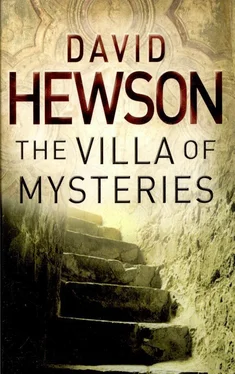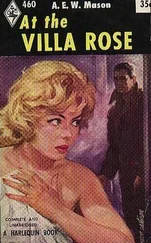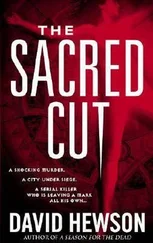The simple answer—that the god, and by implication Kirk and his associates, were exploiters of young women—didn’t fit this story. There was, Costa realized, some form of reward on both parts, and some kind of revenge if, for whatever reason, the bargain wasn’t kept.
He forced himself to stop examining the pictures. They had a hypnotic, openly erotic quality that drew him in, made it hard to think of anything else. Costa scanned the corners, his eyes becoming more used to the shade. There was a door, dimly visible in the shadows beyond the bed. He walked towards it and touched the surface: old, tough wood. It was locked but as he rattled the handle he heard a sound from the other side: a surprised gasp, not far away. And female.
He thought of the night before and the bright blonde head disappearing into the maw of the cave, that repeated again and again in the photographs that covered the walls of the central chamber. Costa drew himself close to the crevice and tried to peer through. The wood wasn’t a perfect fit. There was light on the other side, the same dim, faint luminescence as in his own chamber.
“Suzi—” he whispered through the crack. Someone moved on the far side. He heard her breathing.
“Suzi—” he said again, more loudly. “My name is Nic Costa. I’m a police officer. Please look at the door. See if you can let me in. Let me help you.”
The person on the other side didn’t make a sound. He tried to put himself in her shoes: trapped, lost in this labyrinth, not knowing what to do, or who to trust.
“I talked to your mother,” he said in a normal, controlled voice. “She’s worried about you. This will all work out. Trust me. Please.”
He thought he heard a choked sob. Maybe she wasn’t alone. Maybe Mickey Neri was there, holding a knife to her throat, trying to work out what to do with the pair of them. Costa hadn’t thought about his own fate for a moment. Now that he did, something puzzled him. Why had Mickey let him live at all? If Neri just wanted him out of the way he’d surely be dead, or somewhere far from the heart of what was going on.
“Suzi—” he said for one last time.
There was a sound on the other side of the door: a bolt being drawn back.
Costa made a conscious effort to think like a cop again. He needed a weapon. He needed to know where they were, how the hell they could find a way out of this damp, stinking place.
The door didn’t move. He heard footsteps receding on the other side.
“It’s OK,” he said. He took hold of the handle, turned it and pushed gingerly. The old wood creaked open. On the other side was a room much like the one he’d woken in: small, almost circular, with paintings round the wall, a double bed with a single light bulb above it, and opposite, in the shadows, another door.
She stood against it with her back to him, hair shining under the wan light, shoulders hunched, crying he guessed, most likely terrified.
Nic Costa walked over and put his hands on her shoulders, unable to take his eyes off that bright, gleaming head of hair.
“Suzi—”
She turned suddenly and thrust her face into his chest, threw her arms around him, clenching his back hard with her hands.
He held the taut, slim body, his head beginning to spin, trying to work out why this felt wrong.
Her mouth worked its way to his neck. Warm, damp lips brushed his skin, a tongue flickered against day-old bristle.
Automatically, his hand went to her head, felt the soft hair, pushed her gently away.
“Suzi—” he said, then was quiet.
It was as if two people had merged into one. Or as if they had never been quite separate in the first place.
Tears starting to stain her cheeks, her face framed by this bright shock of too-young hair, Miranda Julius looked up at him, pleading, drawing him ever closer.
“I’m sorry, Nic,” she said. “I didn’t want you here. I’m sorry.”
“Don’t be,” he whispered, and found his hands roaming her shoulders, holding her tight to him, his lips close to her shining head, his eyes locked on the figures dancing over the walls.
BEYOND THE GLASS of Leo Falcone’s office the Questura buzzed furiously. For once the rival forces of the DIA and the carabinieri were making an effort to work in tandem, sharing information, scouring the streets for any sign of Emilio Neri. The old hood had gone to ground, and it was clear he had done it well. For all Falcone knew he could be out of the country already. The networks of informers used by all three organizations had come up with a few nuggets of information. They told him what he already suspected: the blast outside the house in the Via Giulia was Neri’s own work, a parting gift deliberately timed for the arrival of the police. There would be no return. From this point on Neri would hide out abroad, doubtless somewhere he believed the Italian extradition laws would never reach him.
Vergil Wallis sat opposite wearing his long leather overcoat, a brown travel bag on his lap, black face impassive as a rock, and said, “I’m glad you made time for me in the middle of all this.”
“You seemed to think it was important,” Falcone replied.
“It is.” Wallis opened the bag and took out a digital camera, turned on the screen, and passed it over the table.
“What the hell’s that?” Falcone asked.
“Got thrown over my wall at three this morning,” Wallis said. “With this.” He held up a mobile phone. “Started the dogs barking. I’m surprised those people you’ve got outside never saw who did it.”
Falcone screwed up his eyes at the picture on the little screen. “They’re not ours. That was the DIA’s job.”
He picked up the camera. Peroni came and stood behind him then swore softly under his breath. The picture was of Nic Costa unconscious, lying on a bed in an anonymous room.
“This is my fault,” Peroni groaned.
Falcone pressed a button. The next picture was of Miranda Julius, her hair dyed the same bright blonde they all now associated with her daughter, scowling at the lens, tied to a chair. Then a third. The lighting was slightly different this time. More harsh. It looked as if the picture had been taken in different circumstances. The face was that of a young girl, with the same blonde hair, looking vacantly into the camera. She too was tied to a chair, but somewhere else.
“That’s the missing girl?” Wallis asked.
“Suzi Julius,” Peroni confirmed. “We got the pictures her mother gave us. It’s her.”
The big black figure folded his coat around him as if it were a second skin. “There’s a message too. Play the last thing you find.”
They did. It was a little video of Mickey Neri staring straight into the lens, looking scared as hell, glancing around him as if someone else was giving the orders. Mickey gulped once then said, in a mock-tough voice, “Vergil, you bring what I want at ten. Use the phone. I’ll call you and tell you where to collect at seven. At nine I call and tell you where to deliver. You’ll know the way. Don’t come with anyone else. Don’t fuck with me. Do anything other than this and they’re dead.”
“For all we know they’re dead already,” Peroni murmured.
“Maybe,” Wallis agreed testily. “I can’t tell you one way or the other. This is none of my business. What am I supposed to be here? Some kind of messenger boy? What’s going on, huh? Can you tell me that?”
Falcone scanned through the pictures again. “Did you get the call at seven?”
“On the dot. Sent me round to some private banker out in Paroli. He was waiting. He’d had a call too. Got this packed. As soon as I saw it I knew I was passing it on to you guys.”
Wallis opened the bag. It was full of brand-new banknotes, big denominations, still with the ties around them. “Half a million euros there.”
Читать дальше












